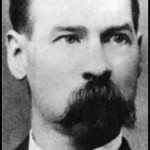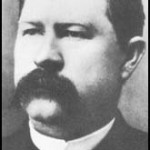1
Earps Were Shooting Long Before the OK Corral
Midway through the Mexican-American War, a promising young soldier was literally kicked out of the United States Army. In December of 1847, a 33-year-old dragoon sergeant returned to his Monmouth, Illinois home because of an injury he incurred when kicked by a mule.
Waiting for the sergeant was his pregnant wife, Ginny. When she delivered the following March, her husband named his newborn son after his company’s captain, whom he admired and respected.
The soldier was Nicholas Porter Earp, patriarch of the famous Earp clan of the American West. His captain was Wyatt Berry Stapp, and the babe saddled with three given names needed only the first to become the legendary Wyatt Earp.
Wyatt was greeted by three siblings, 6-year-old James, 4-year-old Virgil, and 2-year-old Martha. Completing the Earp household was 10-year-old Newton, Nicholas’s son from his first marriage.
Shortly after Wyatt’s birth, Nicholas moved his family to Pella, Iowa where he acquired 160 acres in Marion County. Nicholas may have had only moderate success growing corn on the prairie of south-central Iowa, but his family continued to grow with the births of sons Morgan in 1851 and Warren in 1855.
In March of 1856, Nicholas sold his Iowa property and moved the family back to Monmouth, where daughter Martha died in May. Two years later, the Earps returned to Pella, where Nicholas again purchased property, including a lot in town. Daughter Virginia was born in Marion County on February 28, 1858, only to die there in October of 1861, four months after the birth of Nicholas and Ginny’s last child, Adelia.
Thus, the opening of the Civil War found the Earps in Central Iowa, with Nicholas serving as a United States Provost Marshall, responsible for recruiting and drilling companies in the Pella area. By the summer of 1862, his three oldest sons had become Union soldiers.
Nineteen-year-old James Earp was the first to enlist. In May of 1861, he returned to Monmouth (which he identified as home on his enlistment papers) and was mustered into Company F of the 17th Regiment of Illinois Infantry at Peoria. The regiment was organized and armed at Alton before being sent south. On October 31, 1861, the 17th engaged Missouri State Guard forces near Frederictown, Missouri, sustaining over 60 casualties. James was severly wounded in the battle. Although he remained in the army for over a year, he was discharged in March 1863 for disability.
Newton Earp also joined the Union army in 1861, as a member of the 4th Iowa Cavalry Regiment. On November 11, he likely traveled to Ottumwa, about 45 miles southeast of Pella, to enlist as a private before being sent another 50 miles east to Mt. Pleasant where the 4th Cavalry was being organized. Company F, to which 24-year-old Newton was assingned, was organized on November 23, 1861. On February 20, 1862, the 4th Cavalry was sent to St. Louis to be equipped, and throughout the remainder of the war it saw significant action in Missouri, Arkansas, Mississippi,and Tennessee.
On September 1, 1863, Newton was promoted to the rank of 8th Corporal. When he reenlisted as a Veteran on December 12, 1863, his rank was 7th Corporal. Between then and January 1, 1865, he received four more promotions and left the cavalry as a 4th Sergeant in the summer of 1865.
Virgil Earp, as his brother James had done the previous year, returned to Monmouth to join an infantry regiment. Enlisting on July 26, 1862, he was mustered into Company C of the 83rd Illinois Infantry Regiment on August 21. The 83rd served primarily in Tennessee, often on garrison duty.
Unlike James, Virgil escaped being wounded; and unlike Newton, he did not rise in rank. However, Allan Barra, in his book Inventing Wyatt Earp: His Life and Many Legends, mentions what may be the most notable aspect of Virgil’s military experience: his court martial. Barra does not include details of Virgil’s offense, possibly because they no longer exist, but he assumes it was of an insignificant nature as Private Earp’s punishment was a mere forfeiture of two weeks’ pay. Virgil was mustered out in the summer of 1865 and honorably discharged.
Only seventeen at the time of his enlistment, Virgil was the youngest Earp in the Union army. With Nicholas often away from home recruiting soldiers, thirteen-year old Wyatt was left to run the family’s 80-acre farm aided by younger brothers Morgan and Warren.
However, in 1863, Wyatt, then fifteen, attempted to become a soldier. He somehow made his way to Ottumwa, where he hoped his height and strapping physique would belie his age. His plan might have worked, except that Nicholas was in town that day (possibly seeing off some of his recruits) and summarily put an end to Wyatt’s military aspirations.
None of the Earp boys was sworn into service by his father. Wyatt, obviously, tried to enlist in Ottumwa because it was beyond Nicholas’s recruiting territory, but James, Newton, and Virgil would have had other reasons for going elsewhere to enlist.
Allan Barra attributes the Earps’ choices of enlistment locations to political differences with their father. The boys, Barra asserts, were Lincoln men while their Carolina-born father, although he disapproved of both secession and slavery, opposed the wholesale freeing of slaves. While it is possible, perhaps even probable, that the two generations of Earps would disagree on the issue of emancipation, it does not seem likely that such disagreement accounts for the boys’ choices of enlistment sites.
For one thing, all three of the younger Earps enlisted before Lincoln issued his preliminary proclamation in September 1862 (James in May of 1861; Newton in November; and Virgil in July of 1862). Since Lincoln’s position at the beginning of the war was simply to prevent the spread of slavery, picturing the Earps sitting around the supper table debating what would happen IF Lincoln were to come up with the idea of emancipation seems a stretch.
In addition, other, more plausible, reasons can be considered. James may have returned to Monmouth to enlist simply because he had friends there and wanted to serve with them. Newton, the cavalryman, had little choice of enlistment options. The 4th Iowa Cavalry was being organzied at Mt. Pleasant, with Ottumwa as a feeder recruitment site.
Virgil’s reasons for enlisting in Illinois may have been similar to those of James, but with an interesting twist. In 1860, when Virgil was 16, he eloped with a 15-year-old Pella girl, Ellen Rysdam. Neither family was pleased, but Ellen’s father was infuriated and wanted the marriage annulled. One source says Rysdam was successful, but Donald Chaput, a biographer of Virgil, says the furious father failed to have the union nullified because Virgil and Ellen refused to reveal where they had been married and claimed they had used false names. (If they did so, the marriage was probably invalid and did not require annullment.)
Rysdam at some point supposedly forbade Virgil to see Ellen, which might have led Virgil to seek sanctuary with friends or relatives in Monmouth.
Virgil and Ellen’s daughter, Nellie, was born in the summer of 1862, between Virgil’s enlistment in Monmouth on July 26 and his mustering in on August 21. It is supposed that he saw Nellie briefly, despite Rydam’s vehement objection.
In May of 1864, Nicholas Earp traded his duties as Provost Marshall for those of wagon master and moved his family again, this time to California, where the older sons would eventually gravitate. It was in the West rather than in the War that the Earps ranked highest.
Earp Family Trivia:
- Patriarch Nicholas Earp was a southerner by birth and the son of a Methodist Episcopal preacher. He engaged in numerous occupations, working as a farmer, a cooper, a constable, a justice of the peace, and a bootlegger.
- Virgil, Wyatt, and Morgan were involved in the gunfight at the OK Corral. James was also living in Tombstone at the time, but he was a saloon and gambling house manager, not a lawman.
- Newton Earp filed for a military pension in 1879; James filed for a similar pension in 1890.
- Having been told that Virgil was killed in action, Ellen Rysdam moved with her parents and daughter to Oregon Territory during the Civil War. When Virgil returned to Pella, he could not learn where she was and may even have been told that she had died. Amazingly, Virgil did see Ellen and Nellie one more time. In April of 1899, he visited them, in Portland. The fame of the Earp brothers was so great that Nellie had been able reach him via a letter. Although Virgil married twice after the war, he had no other children, and his widow, Allie Earp, granted Nellie’s request to have Virgil buried in Portand.
What you can do:
- Travel to Pella, Iowa to visit an Earp family home. You might want to visit in May when this Dutch town holds its famous Tulip Festival. Check the Pella website for details.
- Learn more about the remarkably cohesive Earp clan by reading Alan Barra’s book Inventing Wyatt Earp: His Life and Many Legends.



Very interesting and thoroughly researched.